
823.2K
Downloads
213
Episodes
Drawing on years of experience working with families, Parenting Coaches Siope Kinikini and Kimber Petersen share how families can improve, heal, and find success using the proven methods of the Teaching-Family Model. Visit smarterparenting.com to learn more.
Episodes

Wednesday Mar 11, 2020
Ep #74: Getting the right diagnosis
Wednesday Mar 11, 2020
Wednesday Mar 11, 2020
In episode 74, ADHD Parenting Coach Siope Kinikini talks with Dr. Gray and Dr. Crohan about the importance of getting the right diagnosis and how behavior skills can help kids with ADHD.
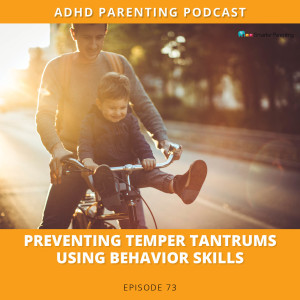
Wednesday Mar 04, 2020
Ep #73: Preventing temper tantrums using behavior skills
Wednesday Mar 04, 2020
Wednesday Mar 04, 2020
Preventing temper tantrums is a question that ADHD Smarter Parenting Coach Siope Kinikini is asked frequently during coaching sessions.
While there are many behavior skills on Smarter Parenting that can address tantrum behavior, the best way to deal with temper tantrums is to prevent them from happening using the behavior skill of Preventive Teaching.
The behavior skill of Preventive Teaching helps a child understand what they need to do in a specific situation. Knowing what to do beforehand allows a child to make corrections and deal with emotions and frustrations before they get out of control. Preventive Teaching gives your child confidence that they can handle any situation.
When teaching the skill of Preventive Teaching, you need to focus on what you want their child to do and not what you don’t want their child to do. Focusing on what we want a child to do, helps our child rewire their brain, and adopt the new positive behavior. Talking about a new behavior isn’t enough. The real change comes when we Role-play or practice. We recommend that parents practice the new behavior as many times as needed until both you and the child are confident in your ability to do it.
Using Preventive Teaching to stop tantrums before they start isn’t a quick fix. It’s a lasting fix that will take time and effort to implement but will pay huge dividends. Preventing temper tantrums will change the dynamic of your family and improve your relationship.
If you are looking for specific help for tantrums, sign up for a free mini-coaching session. During the session, our ADHD Parenting coach Siope Kinikini will be able to dive deeper into the situation and will give you tailored information that will help your family find success. https://www.smarterparenting.com/coaching/
To learn the behavior skills on Smarter Parenting visit: https://www.smarterparenting.com/lesson/
For show notes and transcript visit: https://www.smarterparenting.com/adhd-parenting-podcast/
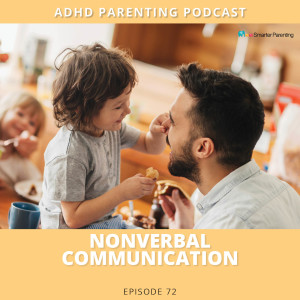
Wednesday Feb 26, 2020
Ep #72: Nonverbal communication and messages we're sending
Wednesday Feb 26, 2020
Wednesday Feb 26, 2020
A lot of how we communicate is done by nonverbal communication. How we position our bodies, how we use or arms, or our facial expressions all send a message to those we are communicating with.
Understanding how we are communicating nonverbally goes a long way in increasing our relationship with our children. This is especially important when we're having difficult conversations as our nonverbal communication can be making the situation worse.
Things like standing over our child, or facing our child, or standing too close, can send signals of dominance or aggression, especially if feelings are running high. Parents can get a good idea of how a child is feeling by watching their nonverbal communication. Are their arms folded? Are they moving away?
When parents have a grasp of nonverbal communication and the importance of body language, they can focus on shifting problems and difficult conversations "in front of you." What do we mean by this? When we shift our body language, we can shift the message we are sending our child. Instead of a problem being between us and hurting our relationship, the problem is in front of us. Now, together we can solve the problem, and the problem won't damage our relationship. That is powerful!
The behavior skill of Effective Communication on SmarterParenting.com helps parents increase their communication skills.
We offer free 15-minute parenting coaching mini-session to help parents with nonverbal communication. Don’t put off healing your family! Sign-up today. https://www.smarterparenting.com/coaching/
To learn the behavior skills on Smarter Parenting visit: https://www.smarterparenting.com/lesson/
For show notes and transcript visit: https://www.smarterparenting.com/adhd-parenting-podcast/
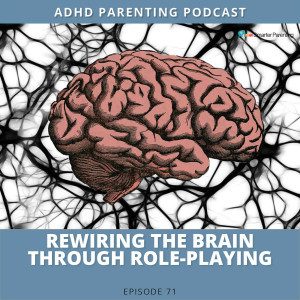
Monday Feb 24, 2020
Ep #71: Rewiring the brain through Role-playing
Monday Feb 24, 2020
Monday Feb 24, 2020
Rewiring the brain through Role-playing may seem like science fiction, but it's not. Learning rewires the brain. Kids can learn new things if a parent will be consistent and deliberate in their teaching and use of Role-plays.
Role-playing, or practicing, helps a child work at a behavior until it becomes second nature. Parents can Role-play almost anything, including behavior you want changed or preparing for future events.
When a child practices a behavior, it helps strengthen the connections in their brain—the stronger a connection, the higher their ability to perform the behavior without effort.
Parents always want to know how to rewire the brain. There are six things we recommend:
First, Role-play with your child at a neutral time. The goal of Role-playing is to help strengthen the connections in your child's brain. It's harder to strengthen those connections when your child is distracted. Practicing at a neutral time allows your child to focus on the new behavior.
Second, start small. Role-playing can be challenging for a child. Starting with something little that they can find success with gives them confidence that they can do Role-plays.
Third, take breaks. Role-playing for success means practicing behavior multiple times. Practice. Take a break. Practice. Take a break. By practicing and taking a break, it allows you to see if your child has incorporated what you’re practicing or if they're still struggling with it.
Fourth, help your child visualize the Role-play. Visualization is a powerful tool for children as it helps them make sense of the world around them and makes those connections more firm.
Fifth, integrate their senses. The more senses you're able to incorporate, the more they're able to remember it.
Sixth, reverse Role-play. In reverse Role-plays, a parent Role-plays the behavior they want. This allows a child to see exactly what action you expect.
Role-plays are powerful in rewiring your child's brain and helping them find success.
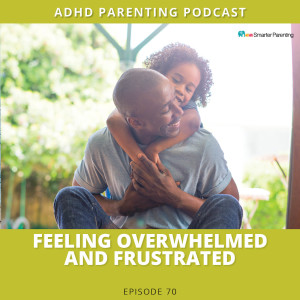
Wednesday Feb 19, 2020
Ep #70: Feeling frustrated and overwhelmed
Wednesday Feb 19, 2020
Wednesday Feb 19, 2020
When you are feeling overwhelmed and exhausted with parenting, what you want is parenting solutions. You want something that can help your family heal and move forward. The behavior skills on Smarter Parenting is what families need.
The reason we are feeling overwhelmed all the time is that parenting is challenging, and because we love our kids, we want what is best for them. Parents don’t always know how to do that.
Some simple tips can help overwhelmed parents.
- Remember: It’s because we love our kids and want what’s best that we feel frustrated.
- Vent: It’s okay to discuss our frustration, and then we need to figure out how to use our frustration to help our kids.
- Focus on the big picture: Determine what the ultimate goal we want is. Then using behavior skills, set up small steps to get there.
- Be okay with slow progress: Change isn’t going to happen overnight--and that’s okay. Celebrate small victories and remember that small steps lead to something significant over time.
The behavior skills on Smarter Parenting help parents take their feelings of frustration and start working towards healing. Each behavior has steps that allow parents to know exactly how to respond to a situation.
If you are a parent who is feeling overwhelmed all the time, join the Smarter Parenting Club. With the club, you can get specific answers to your family’s problems. Don’t put off healing your family. Sign-up today. https://club.smarterparenting.com/
To learn the behavior skills on Smarter Parenting visit: https://www.smarterparenting.com/lesson/
For show notes and transcript visit: https://www.smarterparenting.com/adhd-parenting-podcast/
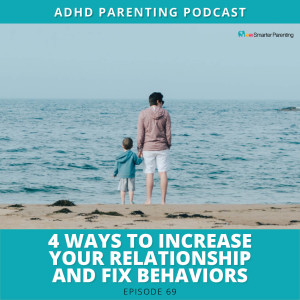
Monday Feb 17, 2020
Ep #69: 4 ways to increase your relationships and fix behavior
Monday Feb 17, 2020
Monday Feb 17, 2020
When parents in pain reach out to ADHD Parenting Coach Siope Kinikini, he gives them the following four things to do. When we are overwhelmed and unsure of what to do next, it is so helpful to have someone give us some concrete things to do that allow us to address the problems and find solutions that work for our family.
The four things are: slow down and identify fears, focus on what we can control, build the relationship, teach the behavior skills
Parenting from a place of fear isn’t productive. It’s easy to get caught up in our fears of what may happen that they drive all our reactions. Slowing down and identify the fears we have for our child allows us to attach behavior skills. Behavior skills give us a road map and help alleviate the unknowns and our responses to them. Sometimes we get so caught up in what is happening and our fears for what may happen.
Focus on what we can control as there is a lot in parenting we can’t control. We can’t always control how our child behaves or reacts. We can’t control how others will respond to our child’s behavior. What we can control is how we act. We can control our responses and our stress level. It also may mean changing expectations or routines to better work with what we can control.
Focus on the relationship instead of your child's negative behavior. While this may seem counter-intuitive to many parents who are struggling, what we focus on is what grows. If we only focus on their negative behavior, we actually may be making the behavior worse. Focusing on the relationship gives you a long-term focus. All skills of the Teaching-Family Model are focused on building and strengthening relationships. You can create connections by reminiscing on memories, spending time together, taking the time to listen, doing an activity they’d like to do, etc. Focusing on the relationship does not need to involve a lot of money or resources. A lot of progress can be made with simple one-on-one activities.
Teach the skills the way they should be taught. Just talking about the skills with our kids isn’t enough--we have to practice. Role-playing is a vital component in bringing about the change you want. If your child isn’t adapting a skill, increase your Role-play.
No matter what a parent is facing, this advice is relevant to parents of kids of all ages and all behavior problems.
If you are a parent in pain, join the Smarter Parenting Club. You can get specific answers to your family’s problems. Don’t put off healing your family. Sign-up today. https://club.smarterparenting.com/
To learn the behavior skills on Smarter Parenting visit: https://www.smarterparenting.com/lesson/
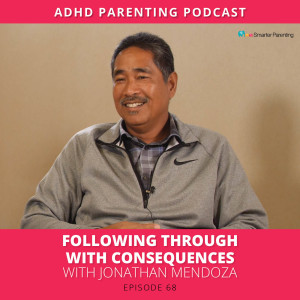
Wednesday Feb 12, 2020
Ep #68: Following through with consequences with Jonathan Mendoza
Wednesday Feb 12, 2020
Wednesday Feb 12, 2020
One of the hardest things for most parents is following through with consequences. Parents have difficulty following through with consequences for several reasons. They forgot. They had no intention of ever following through (and the kid knows it). They choose a consequence that is unrealistic for them to do.
Jonathan Mendoza from Catholic Charities in Hawaii talking about the importance of Following Instructions and consequences for kids with ADHD. Children with ADHD struggle to connect their actions with positive or negative behavior, so parents need to focus on teaching cause and effect, and that’s done by rewarding good behavior or being consistent in following through with consequences.
When parents are consistent in rewarding behavior or following through with consequences, it helps a child connect their actions with the outcome. The behavior skill of Following Instructions is a great way to help a child learn how to connect their behavior to outcomes.
We recommend that when parents start teaching Following Instructions, they begin small. Give your child small tasks that they need to accomplish. If they finish the job, immediately give them a little reward. The reward can be things like words of praise, a hug or high five, a sticker, or a small piece of candy. If the child doesn’t follow the instruction, immediately give them a consequence. The consequence could be something like losing playtime or tablet time, earning an extra chore, or timeout. What rewards or consequences you give your child will be different as you know what will work best for your child and your situation.
When a child has mastered Following Instructions for little things, it is easier for them to do it with big things.
It can be hard to be consistent in giving consequences or rewards, but it will make such a difference in your family. When you are consistent your child views you as fair and someone they can trust.
To learn the behavior skills on Smarter Parenting visit: https://www.smarterparenting.com/lesson/
For more information about how Smarter Parenting uses the Teaching-Family Model, visit the episode podcast page on SmarterParenting.com https://www.smarterparenting.com/adhd-parenting-podcast/
If you are looking for specific help in knowing when to teach behavioral skills, join the Smarter Parenting Club. https://club.smarterparenting.com/
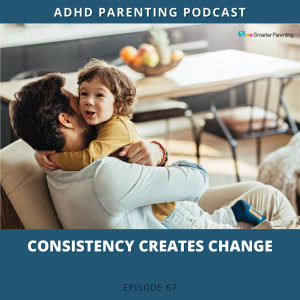
Monday Feb 10, 2020
Ep #67: Consistency creates change
Monday Feb 10, 2020
Monday Feb 10, 2020
Lasting change in behavior doesn’t just happen. Creating lasting change is not a quick-fix. Change requires a parent to be consistent over and over as consistency creates change. When changing a child’s behavior, remember that small, daily improvements lead to long-term success.
Success in parenting requires parents to take an honest look at their strengths and weaknesses. For most parents, success will come when they can focus on their strengths and know what they can realistically do. Setting goals that you won’t be able to follow through creates frustration for you and your child and will put a strain on your relationship.
If you set goals that are dependent on your child doing a specific behavior every time, you’re destined to be frustrated and not find success. When setting goals, parents should always focus on setting goals for things they can control. You may not be able to control how your child will react, but you can control what you will do.
When focusing on things to change, start with one behavior. Once you and your child has mastered that behavior, then add another behavior. The first change usually takes the longest for your child to implement, so don’t give up if the change isn’t happening as quickly as you’d like. Each change you implement after the first will be easier for you and your child.
We won’t be perfect parents, but we can be consistent parents in changing a child’s behavior. Success is not having your child behave the way you want them to act; success is being able to follow through every time no matter how your child reacts.
When you are consistent, it tells your child that they matter as the child doesn’t have to “guess” at they’ll get in trouble for or what they won’t. Consistency will help you and your child build a healthy relationship. Being consistent also prepares them to navigate the world without your help as it shows them that the world has rules that need to be followed.
To learn the behavior skills on Smarter Parenting visit: https://www.smarterparenting.com/lesson/
For more information about how Smarter Parenting uses the Teaching-Family Model, visit the episode podcast page on SmarterParenting.com https://www.smarterparenting.com/adhd-parenting-podcast/
If you are looking for specific help in knowing how to teach behavioral skills, join the Smarter Parenting Club.
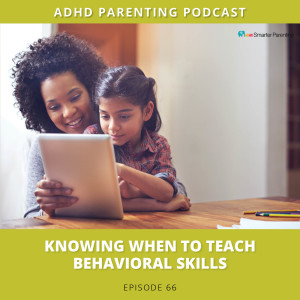
Wednesday Feb 05, 2020
Ep #66: Knowing when to teach behavioral skills
Wednesday Feb 05, 2020
Wednesday Feb 05, 2020
One of the biggest mistakes parents make in teaching behavioral skills is when they are teaching them. When a child or parent is upset, frustrated, or angry, that is the worst time for parents to be teaching a new behavior skill. If parents continually insist on teaching at times when a child isn't calm, it can damage the relationship.
If you want your child to get the most out of your teaching, parents need to be teaching at a neutral time. A neutral time means a time when you or your child aren't distracted, a time when they are calm and able to learn. Teaching behavior skills is all about helping kids learn and grow, and when you teach at a neutral time, you are encouraging them to find success. You show that you are concerned about what is happening in their life, which strengthens the relationship.
When teaching a new behavior skill, we recommend that parents teach the behavior skill long before it will be a problem and then Role-play with their child until they can do it on their own. By practicing it over and over until they are comfortable, your child understands what they need to do and has confidence they can do it.
For example, if your child has difficulty putting away their toys before bed, don't teach them the skill at bedtime. Instead, practice the skill with them multiple times throughout the day and showing them precisely what they need to do at bedtime by modeling what they need to do. Or, if they have difficulty turning off their video game, don't start teaching them to turn off their game when they are in the middle of a game. Instead, practice with them at a time when they aren't distracted by the game.
For things that are difficult for a child to do, it never hurts to reward a child for practicing. If they practice picking up their toys, they can earn five more minutes of playtime at bedtime. Or if they practice turning off their game, they can receive extra playtime.
When teaching our children, it's helpful to self-evaluate where we are. If we are feeling stressed or overwhelmed, we won't be effective in our teaching. Have you ever come home from work and see a backpack on the table instead of on a hook and get incredibly frustrated? It happens, and parents need to find things that allow them to bring their stress levels down before addressing the issue. It could be taking a walk or counting to ten. Then, once we are calm, we can better address the situation and to teach our child.
Children feel our stress and frustration and often respond in kind. On the other hand, if we are calm, our children will model that behavior.
The goal of teaching behavioral skills is changing a child's behavior to help them navigate the world without our help. Teaching at a neutral time will help you achieve this goal.
To learn the behavior skills on Smarter Parenting visit: https://www.smarterparenting.com/lesson/
For more information about how Smarter Parenting uses the Teaching-Family Model, visit the episode podcast page on SmarterParenting.com https://www.smarterparenting.com/adhd-parenting-podcast/
If you are looking for specific help, join the Smarter Parenting Club. https://club.smarterparenting.com/
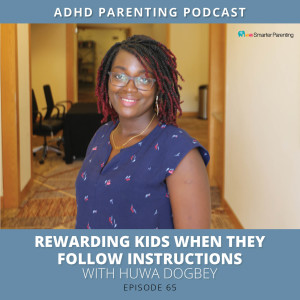
Monday Feb 03, 2020
Ep #65: Rewarding kids when they Follow Instructions with Hawa Dogbey
Monday Feb 03, 2020
Monday Feb 03, 2020
Join the Smarter Parenting Club. https://club.smarterparenting.com/
When parents reward kids when the Follow Instructions, they encourage their child to repeat the behavior.
Rewarding a child doesn’t have to be costly or involved. Sometimes the most effective rewards are one-on-one time with mom or dad, getting a hug or high five, or choosing a family activity.
Different rewards will motivate different kids, and those rewards will change as the child gets older.
We always recommend involving kids in rewards as it allows them to know you’re focused on building the relationship sometimes though kids can ask for rewards that don’t match the behavior or aren’t things that parents can do.
As a parent, you can help guide them to rewards that would work. Have them write out a list of rewards they would like. Then decided what rewards you think are doable. It may take a bunch of back and forth to get to rewards that both you and your child think are fair.
Different kids may want a different reward on different days for the same behavior. Having a list of three or four rewards they can choose from is helpful as it reduces discussion and makes it easier to follow through.
Teaching kids to Follow Instructions is such an important part of helping children learn to navigate the world.
To learn more about Following Instructions visit: https://www.smarterparenting.com/lesson/view/following-instructions/
To learn more about the agencies worldwide that are using the Teaching-Family Model visit: https://www.teaching-family.org/
For more information about how Smarter Parenting uses the Teaching-Family Model, visit the episode podcast page on SmarterParenting.com https://www.smarterparenting.com/adhd-parenting-podcast/
